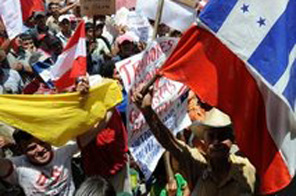Civil war fear for Honduras
TEGUCIGALPA: An international mediator warned of civil war in Honduras after the failure of talks between representatives of the country's rival governments.
Talks broke down late Sunday after representatives of the de facto rulers rejected a proposal by mediator Oscar Arias, the Costa Rican president, that ousted leader Manuel Zelaya go back as president in charge of a "reconciliation" government.
Arias, who has won a Nobel Peace Prize for his work resolving conflict in Central America, warned Honduras was at the brink of "civil war and bloodshed".
"We have started organizing internal resistance for my return to the country," Zelaya told reporters in Nicaragua, where he has been based since he was forced out by the army on June 28.
Arias pleaded for the talks to resume after a 72-hour break but there was no sign his appeal would be heeded, though sources close to the negotiations said the two sides might meet again Wednesday.
Neither Zelaya nor the head of the de facto government, congress leader Roberto Micheletti, were in Costa Rica for the talks.
Michelette's representatives took exception to Arias's use of the words "civil war." Its deputy foreign minister, Martha Lorena Alvarado, accused the Costa Rican president of "taking us towards a situation of near-panic" with the phrase.
She welcomed the call for 72 hours' reflection, but ruled out allowing Zelaya's return as president.
Micheletti's government has promised to arrest Zelaya if he does return and prosecute him for treason and 17 other charges.
Zelaya's supporters in Honduras, however, said they would intensify their protests pressing for his reinstatement. They called a strike for Thursday and Friday.
The leader of the National Front Against the Coup d'Etat, Berta Caceres, told AFP her group opposed Arias's plan for a reconciliation government that included what she termed "the putschists."
The secretary general of the Organization of American States, Jose Miguel Insulza, said his body would press Honduras's de facto government to recognize "this is a coup that failed." The OAS would hold a meeting Monday on Honduras, he said.
Zelaya has vowed to go back to Honduras with or without agreement from his rivals.
He tried to fly back on July 5 on a plane borrowed from his ally, Venezuelan President Hugo Chavez, but aborted the landing when Honduran military vehicles parked on the runway.
Rumors suggested he might next try to cross the border from Nicaragua.
Many Honduran lawmakers, judges and military leaders believe Zelaya triggered the crisis by organizing a June 28 referendum, without congressional approval, on changing the constitution.
They fear the wealthy rancher, who swerved sharply left after being elected in 2005, wants to lift the one-term limit on Honduran presidents to prolong his mandate.
Such a move has been adopted by several leftwing leaders in Latin America, all following Chavez's suit.
President Evo Morales of Bolivia and Rafael Correa this year changed rules to enable them to stay in power.
Nicaraguan President Daniel Ortega chose Sunday -- the 30th anniversary of his leftist Sandinista revolution -- to declare he, too, would seek to change his country's constitution to seek reelection.
The United States urged both sides "to commit themselves to their successful conclusion".
A statement issued late Sunday by acting State Department spokesman Robert Wood urged more energetic efforts to achieve a negotiated solution.
"This weekend's talks produced significant progress, and created a foundation for a possible resolution that adheres to the principles of the Inter-American Democratic Charter and the decisions taken within the Organization of American States," Wood said.
Washington has backed the OAS demand that Zelaya be returned to power, and frozen military aid to the de facto government. But it has also warned Zelaya against rash moves that might jeopardize dialogue.






